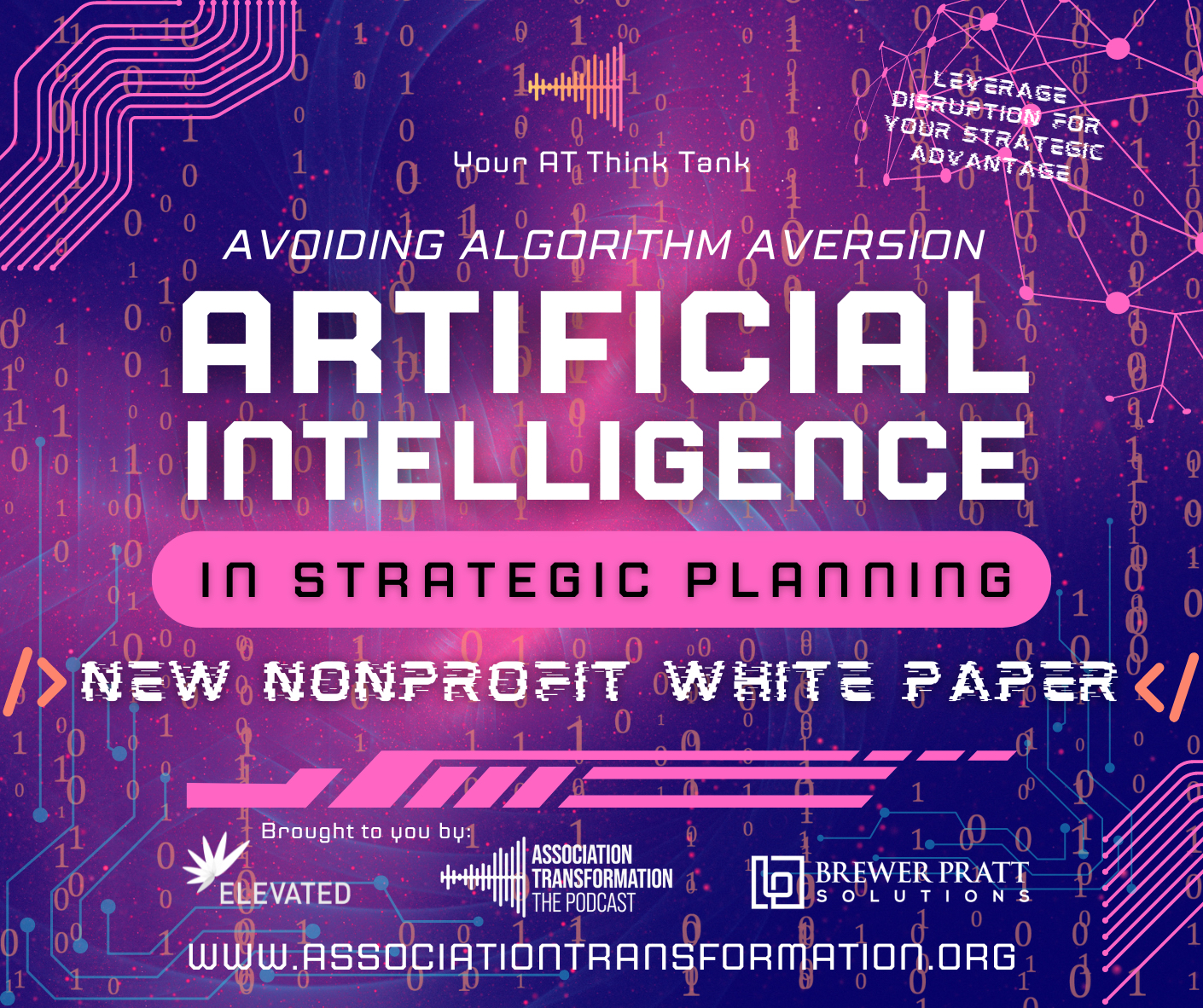
This guest blog post is by Andrew Chamberlain.
Artificial intelligence (AI) is part of our daily lives (just think about Amazon’s Alexa, Apple’s Siri or Netflix and Spotify algorithms) and in a business context, AI is already transforming the way we work, collaborate, and create. Our use of AI however is still relatively limited to task automation, data analysis, and prose composition; but on a seemingly weekly basis we are introduced to new ways in which AI can add value to our associations, from marketing and communications to income generation and market research. The use of AI in strategic planning therefore seems inevitable; and whilst associations should be encouraged to use all available tools and embrace and utilize technology, it is imperative that leadership teams understand the potential and the limitations of AI. We must also ensure our leadership teams remain in control of decision-making and be recognized as the owners of strategy rather than simply interested observers of the development process.
A 2023 study by the McKinsey Center for Strategy Innovation found that only 7% of respondents to their survey about the use of AI said they use it in strategy development or financial planning, whereas in areas like marketing, supply chain, and service operations, its use is nearer 25-30%. One reason adoption is lagging is that strategy is one of the most integrative conceptual practices and when executives think about strategy automation, many are looking too far ahead, searching for AI capabilities that can decide the correct strategy, in place of the business leader. In doing so, they are missing opportunities to use AI as the building blocks of strategy that could significantly improve outcomes.
As the custodians of their association, a board of directors has a distinct responsibility and an exceptional opportunity to apply the pivotal skill of futures literacy by envisioning a future for their organization and shaping and controlling its direction through the seminal function of strategic planning. Leadership teams are increasingly adept at strategizing, growing in their confidence to horizon scan, interpreting their organization’s circumstances, and challenging the status quo. They do however continue to rely heavily on the traditional suite of macro-environment analysis models like PESTLE, which can require long lead times for data analysis and depend on historical data as well as ‘gut instinct’ or conjecture. Developing a strategic plan can be complex and time-consuming. It requires a lot of data collection, analysis, and synthesis, as well as creativity, collaboration, and communication. It also requires a lot of flexibility and adaptability because of the need to routinely update and revise a plan to reflect changing realities and opportunities. This is exactly where AI can help:
- Collecting and analyzing data: Descriptive AI can help collect and analyze data from various sources to provide a comprehensive and accurate picture of the current situation and performance of an association. In addition, AI can systematically and effectively identify patterns and signals that may be missed by humans; and it can facilitate insights that inform strategy formulation or deliver early warning signs of threats.
- Formulating and evaluating ideas: Diagnostic AI can organize a strategy portfolio into logical segments, while Predictive AI can provide a systemic view for decision makers, generating and evaluating ideas for the vision, mission, goals, and strategies of an association. AI can use natural language processing to create and communicate clear and compelling statements that reflect the purpose and values of an organization; and AI can also use machine learning and deep learning to suggest and rank the best ideas that are aligned with the data and objectives.
- Creating and executing plans: Generative AI can help to create and execute plans for the implementation and monitoring of the strategic plan; and it can use project management and workflow automation tools to assign and coordinate tasks, resources, and timelines, and to track and measure the progress and performance.
As well as being a data-driven process however, strategy development is also an intellectually demanding process, underpinned by cognitive insights. It involves reasoning, requires problem-solving, and necessities a corporate learning culture. To inform their decisions, leadership teams must identify underlying patterns, gain meaningful insights, and use probability techniques to support their judgement. AI is no substitute for emotional intelligence, and whilst new and emerging tools have a high potential to improve ‘decision intelligence’ for better outcomes, the role of humans in strategic planning will not become redundant. Strategy formulation is a highly conceptual process, underpinned by an understanding of complexities, strategic thinking, and decision making. AI is capable of automating operational decisions, identifying patterns, and providing insights with limited prediction but is currently incapable of solving undefined problems and generating options for corporate strategies that need to be clearly formulated.
Currently, AI can only perform when it knows what to look for, such as patterns in a large volume of data to identify insights that can help leadership teams inform their strategic decision-making, albeit a strategic ‘problem’ or goal needs to be articulated first. Even with the advancement of strong AI development, “humanized AI” will not become a substitute to effective strategic leadership any time soon; and to that end, today AI is more of a tactical rather than strategic tool, albeit with great potential to support strategic planning and decision-making as a core part of the building blocks of strategy. AI-human collaboration is the driver that will advance an organization’s approach to strategic planning.
We’ve written a white paper which explores the transformative potential of AI, examining key ethical risks around bias, privacy, and a potential over-reliance on AI, and charting a path for developing human-centered, ethical AI frameworks that elevate rather than replace strategic leadership teams. We hope you benefit from our insights and that you welcome our call for associations to pioneer the AI-enabled future of data-driven, technology-fueled strategic planning for exponential organizational success. Do please share far and wide and let us know your thoughts and ideas for avoiding algorithm aversion! Download at https://associationtransformation.org/white-papers.


